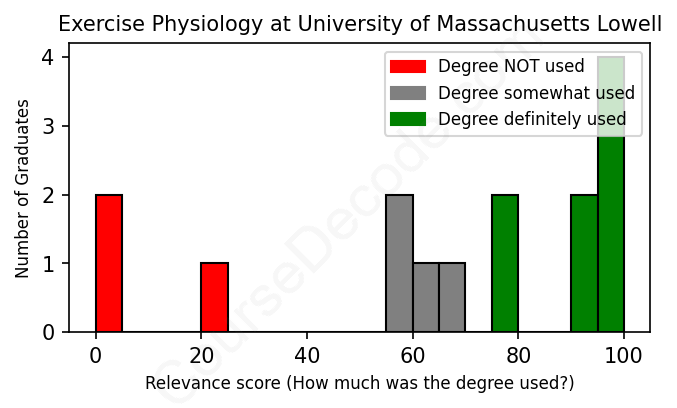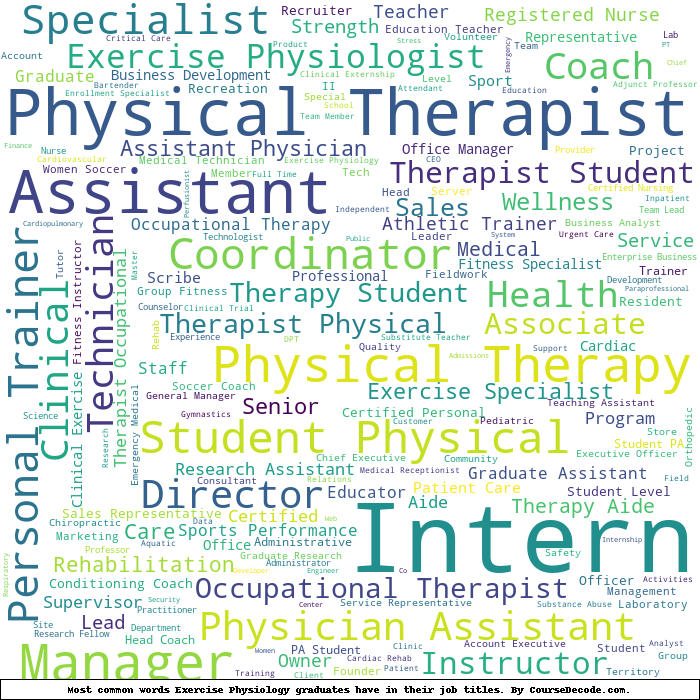
First, some facts. Of the Exercise Physiology graduates from University of Massachusetts Lowell we've analyzed , here's how many have used (or NOT used) their degree in their career:

These are estimates based on AI analysis of 15 LinkedIn profiles (see below).
The verdict? Slightly below average. Overall, with an average relevance score of 66%, Exercise Physiology graduates from University of Massachusetts Lowell have a slightly lower likelihood (-1%) of finding work in this field compared to the average graduate across all fields:
And for comparison, here's the chart for all profiles we've looked at across all degrees.
Also, after graduating, 80% of these graduates have pursued further education other than another Bachelor's degree (such as a Masters degree or other), compared to the average across all profiles of 35%. This suggests you may need more than just a Bachelors degree to be competitive as a Exercise Physiology graduate.
See the details:
|
Relevance score: 100% We think this person has gone into a career highly relevant to their degree. We think this person has gone into a career highly relevant to their degree.
DEGREE INFOGraduated in 2017 from University of Massachusetts Lowell with a Bachelor of Science (B.S.) in Exercise Physiology. Also pursued further education since (see below). JOB HISTORY SINCE GRADUATIONPhysical Therapy Aide Healy Physical Therapy & Sports Medicine Dec 2020 - Aug 2021 Physical Therapy Aide  OPTIMA SPORTS THERAPY & REHABILITATION Sep 2021 - Aug 2023 FURTHER DEGREES DONE SINCE GRADUATINGMaster of Science - MSSalem State University 2021 - 2023 ABOUTNo information provided. |
The top 10 most common jobs done by the graduates we've analyzed (ranked most common to least) are:
When you look at the career paths of folks who graduated with degrees in Exercise Physiology from the University of Massachusetts Lowell, a few trends pop out pretty quickly. A lot of alumni have taken on roles like physical therapists, personal trainers, and fitness instructors. These jobs are super relevant to their degrees because they revolve around applying exercise science, rehabilitation techniques, and fitness assessments—basically all the stuff they learned during their studies. So, technicians and physical therapists often require an on-the-ground understanding of exercise physiology, which is crucial for helping clients or patients get healthier or recover from injuries. It's clear that many of these degrees find a solid path into practical, hands-on roles that utilize their educational backgrounds.
However, not all jobs paint the same picture. Some graduates ended up in roles that seem pretty unrelated to exercise physiology—like retail positions at lululemon or software development jobs. While they might have some transferable skills, these roles aren’t really tapping into the core knowledge of exercise science. There are also a few positions in research and community outreach that, while interesting, don't directly apply the day-to-day skills from an exercise physiology perspective. Overall, while the majority of positions are directly relevant, it’s clear that a portion of graduates has strayed into roles less connected to their studies, reflecting a mixed bag where exercise physiology knowledge is used in practical applications, but not exclusively so. It’s good to have diverse experiences, but ideally, you want your degree to help you land a job that makes the most of all those hours of study!
Here is a visual representation of the most common words in job titles for Exercise Physiology graduates (this is across all Exercise Physiology graduates we've analyzed, not just those who went to University of Massachusetts Lowell):

Graduates from the Exercise Physiology program at the University of Massachusetts Lowell generally have diverse and promising career trajectories in related fields. Right after earning their degrees, many of them land roles that are closely connected to health and fitness, such as personal trainers, physical therapy technicians, and exercise physiologists. For example, some students jumped straight into jobs at places like Philips Healthcare, Marathon Physical Therapy, and various fitness facilities. These first jobs typically set a solid foundation for further growth in the healthcare and fitness industries.
As time goes on, particularly about 5 to 10 years post-graduation, a good number of these alumni transition into more specialized roles. Many advance into physical therapy, becoming licensed physical therapists or moving into research-oriented positions, like clinical research assistants or project managers. A few even venture into educational roles, such as adjunct professors or graduate assistants, which shows a shift towards academia. However, not all paths remain strictly within exercise physiology; some graduates explore unrelated fields or roles, like software engineering or customer support, indicating a varied landscape of career choices. Overall, it seems like those sticking to health and fitness-related careers tend to fare well, while others might drift into different sectors, showcasing the flexibility and breadth of opportunities available after this degree.
Honestly, a Bachelor’s degree in Exercise Physiology can be pretty challenging, but not the hardest degree out there. At the University of Massachusetts Lowell, you’ll dive into a mix of biology, chemistry, and human anatomy, plus some hands-on experience that's super important for understanding how the body works during exercise. If you enjoy science and are passionate about fitness, it can be really rewarding, but be ready for some tough classes and a fair amount of studying. So, while it’s definitely not a walk in the park, if you're committed and stay organized, you can totally handle it!
Most commonly, in the LinkedIn profiles we've looked at, it takes people 4 years to finish a Bachelor degree in Exercise Physiology.
Looking over the career paths of these University of Massachusetts Lowell Exercise Physiology grads, it seems like most of them are steadily building their careers, but when it comes to money, it’s a mixed bag. Those who jumped straight into roles like Physical Therapy and Occupational Therapy likely found better pay compared to those working as personal trainers or in assistant roles at schools and fitness centers, especially in their early years. The presence of jobs at established places like Boston Medical Center and the U.S. Department of Veterans Affairs hints at some strong earning potential down the line. However, some others are still stuck in lower paying roles, like fitness assistants or interns, which might not be as lucrative initially. So, while some might be raking it in, others could be struggling a bit until they hit their stride.
Here is a visual representation of the most common words seen in the "about" section of LinkedIn profiles who have a Bachelor degree in Exercise Physiology (this is across all Exercise Physiology graduates we've analyzed, not just those who went to University of Massachusetts Lowell). This may or may not be useful:

Here are all colleges offering a Bachelor degree in Exercise Physiology (ordered by the average relevance score of their Exercise Physiology graduates, best to worst) where we have analyzed at least 10 of their graduates:
| College | Score | Count |
|---|---|---|
 East Carolina University East Carolina University
|
70 | 15 |
 California State University-Chico California State University-Chico
|
70 | 11 |
 University of Massachusetts Lowell University of Massachusetts Lowell
|
66 | 15 |
 West Virginia University West Virginia University
|
63 | 23 |
 University of Miami University of Miami
|
59 | 11 |
 Florida State University Florida State University
|
55 | 22 |
 Ohio University Ohio University
|
55 | 13 |
 Brigham Young University - Idaho Brigham Young University - Idaho
|
40 | 21 |